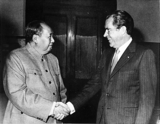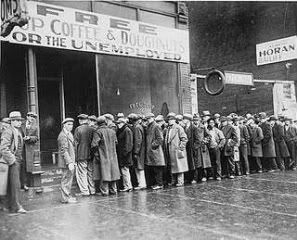Emerging from a comment at the European Tribune.
Cross-posted at Docudharma, ProgressiveBlue, The Economic Populist, and My Left Wing.
 As Jerome a Paris has noted, among others, Paulson and others of his ilk have started blaming the Chinese and Germans for our economic woes:
As Jerome a Paris has noted, among others, Paulson and others of his ilk have started blaming the Chinese and Germans for our economic woes:The US Treasury Secretary said that in the years leading up to the crisis, super-abundant savings from fast-growing emerging nations such as China and oil exporters - at a time of low inflation and booming trade and capital flows - put downward pressure on yields and risk spreads everywhere.
This, he said, laid the seeds of a global credit bubble that extended far beyond the US sub-prime mortgage market and has now burst with devastating consequences worldwide.
The first reaction is to reach for the analogy. For example, this is like blaming the existence of the credit card for my borrowing. Perhaps I borrowed because I am spendthrift. Perhaps I borrowed because I was skint and in desperate need. Perhaps I borrowed what was perfectly reasonable at a former level of income which I no longer enjoy, through no fault of my own. Perhaps a mix of all three.
But supposing I borrowed too much on my credit card(s), the role of the credit card company was accomodating borrowing decisions that, however urgent or feckless, I made.
Its an excellent analogy and will tell most of us much of what we need to bring away from the argument ... the Chinese may have accomodated the US in pursuing recipe for economic growth that is unsustainable in the long-term, but they did not force us to be reckless. Indeed, if individuals in the US were somehow "forced" to be reckless, then that means we have a systemic problem, and we would be better off with a financial system that did not force participants into reckless behavior.
So if Paulson and his ilk want to claim individual lack of responsibility, they certainly cannot lay the blame on China ... they have to look to our financial system. That is, either the house collapsed because of the reckless behavior of the inhabitants, or it collapsed because it was such a ramshackle structure ... but the inhabitants are the ones who built it, so its still there fault.
Running Away From the Washington Consensus
 However, analogies only go so far. To understand more deeply, some historical background is needed.
However, analogies only go so far. To understand more deeply, some historical background is needed.And the striking thing is that if the Chinese are "too blame" for having too much savings, then its Nixon's fault.
Before Nixon we had a system of negotiated exchange rates, with gold used as the formal means of international exchange and the US$ as the effective means of international exchange ... with occasional adjustments of exchange rates. But during the 1960's, with the economic stress of running the Great Society programs while fighting a hot land war in Asia ... (BTW, as a side note, remember that an enduring lesson of the American war in Vietnam, is never get entangled in a land war in Asia) ... the US started feeling stress in terms of our balance of payments.
Nixon, elected on a phony peace platform, did not in fact pursue peace, but rather "peace with honor", which was to say, "return on success" (there was also a period of "Vietnamization" in there somewhere, which is to say, "when they stand up, we'll stand down"). So the stresses did not let up, and by 1970, the US faced a trade deficit (shock, horrors). And then in 1971, Nixon killed Bretton Woods (caveat lector: wikipedia), imposing price controls, an across the board 10% import tariff, and abandoned convertibility to gold. There was some flailing around to re-establish the system, but by 1976, we had landed in the free-for-all system of "dirty floating exchange rates" that we have today.
What does the collapse of Bretton Woods mean? A nation that needs a stable exchange rate with another country can get it two ways: (1) the cooperation of that nation or (2) an exchange rate pegged at a steep discount.
(1) - cooperation - works because any country can pull its exchange rate down. That requires creating its own currency and using it to purchase foreign exchange, "flooding the market". So if two countries cooperate, whichever has the exchange rate above the target rate pulls its exchange rate down, and the exchange rate remains stable.
Except, (1) is much easier said than done. The right policy to stabilize exchange rates might mess up your domestic economy ... in particular, if you want to lift interest rates to fight inflation, flooding foreign exchange markets with your currency will pull your interest rates back down again. That is exactly the problem Britain faced in the early 1990's, trying to stay in the Exchange Rate Mechanism (ERM) in Europe. Roughly speaking, the Germans fighting inflation after the fall of the Berlin Wall, and unwilling to risk inflation at home to defend the ERM. Britain attempted to defend the exchange rate on its own, but that required using foreign currency ... and a country can only use foreign currency until its reserves have been used up. Once Britain could no longer keep the pound propped up, it had to drop out of the system.
So (1) - cooperation - can be tricky. What about (2) ... doing it "on your own" with a deliberately cheap exchange rate?
(2), it turns out, can indeed be done by a country on its own. Pushing your exchange rate down is straightforward. So a country that values a stable exchange rate has to "peg" a "low" exchange rate, so its normally pushing the value down. How hard it has to push ... that will change, but if the exchange rate is pegged low enough, then it will normally be pushing down.
That all means, if China thinks it needs a stable exchange rate (which it does) it has to adopt a cheap, or "discounted", exchange rate. Because we don't have the Bretton Woods system anymore.
And nobody can blame China for bringing down Bretton Woods. That was Nixon (and in fact, the year before Nixon even visited China).
China's "massive official savings"
 Now, the side effect of creating domestic currency to buy foreign exchange to stabilize exchange rates (at a cheap rate) ... is accumulation of official reserves.
Now, the side effect of creating domestic currency to buy foreign exchange to stabilize exchange rates (at a cheap rate) ... is accumulation of official reserves.In other words, China's accumulation of official "savings" is a side-effect of the only stable exchange rate policy it can effectively pursue in the world our country helped create of free for all "dirty floats" in foreign exchange markets.
Now, it can be argued that they are pegged lower than need be ... at least, I hope it can be argued, because I have argued that ... and it can be argued that this is "neo-mercantalism" ... a fancy way of saying they are selling at cut prices to grab market share ... but the point here is not about China.
The point is: who in the hell is Paulson and his sort to complain about that?
You see, until very recently, Paulson and his sort were very sternly lecturing recalcitrant low-income nations on the necessity of having "savings" and "attracting foreign direct investment" and all the rest of what Paulson and his sort are now criticizing China for successfully doing.
And of course its imbalanced, but its precisely the imbalance that they were insisting on. It was just as imbalanced in 2006 when it was helping to sow the trouble that we are reaping today.
And What About Germany?
And Germany? Paulson and his ilk are complaining about Germany?
Well, its not just Paulson ... this is from coverage the Taipei Times, December 20
Jeers about Merkel’s economic strategies have become de rigueur, rankling the corps of German politicians who worked feverishly to pass a US$700 billion banking bailout package within a single week in October and have, after all, promised a good chunk of change already.
"What was urgently necessary for the banks was done, as well as in any country," said Kurt Lauk, head of a business group closely affiliated with Merkel’s Christian Democrats. "And there was a first stimulus package. So we don’t need to hide from France or Britain."
Still, the stimulus packages offered so far pale in comparison to plans floated in the US by the transition team of president-elect Barack Obama for a program of US$700 billion to US$1 trillion.
Lauk says Merkel will not be a new Hoover, who seemed to do his best to drain the US economy of its remaining lifeblood even as the country tumbled into the Great Depression.
But her reluctance to follow other Western countries’ lead has puzzled many allies and struck some of Germany’s critics as oddly ascetic.
Peer Steinbrueck, the German finance minister, has indicated concern over budget deficits and has characterized the British effort to kick-start its moribund economy as "crass Keynesianism." In his view, European pressure for greater spending masked a desire to exploit the German taxpayer for the benefit of the country’s neighbors.
And I will certainly criticize Germany. A stern focus on avoiding anybody taking any free ride on your hard work is an effective way of taking a free ride on the hard work of someone else ... and all the while you are patting yourself on the back for your "prudence" and "fiscal rectitude".
But Paulson??? The hypocrisy of Paulson and others of his sort ... complaining about Germany pursuing the very same neo-Hooverian policies that they themselves would propose for the US if they thought that the finance sector could survive the strain ... is mind boggling.
Well, at least it would be mind boggling if we were not accustomed to Paulson and his like exhibiting extremes of hypocrisy on a regular basis.
A False Dichotomy
 Should we allow big chunks of the productive sector to collapse in pursuit of fiscal rectitude? No, if we do that, we will not be carrying our weight ... and even after forty years of losing economic ground, we still have far too much weight to hope that any other country can carry our load for us.
Should we allow big chunks of the productive sector to collapse in pursuit of fiscal rectitude? No, if we do that, we will not be carrying our weight ... and even after forty years of losing economic ground, we still have far too much weight to hope that any other country can carry our load for us.Well, should we then pursue the Paulson Plan? Should we claw off massive chunks of the product of the productive sector to subsidize an unsustainably large finance sector in something like the standard of living to which they have become accustomed?
 Hell no. There are two little tax and spend secrets of the carefully cultivated Republican "backlash" against the Great Society. The first is that giving a hand up to people at the bottom of the income ladder does not cost all that much money, but providing welfare to the rich so they can keep up with the Joneses Bank Holding Company can drain every spare dollar we have ... and then keep on draining, taking a hefty chunk of what we don't have to spare.
Hell no. There are two little tax and spend secrets of the carefully cultivated Republican "backlash" against the Great Society. The first is that giving a hand up to people at the bottom of the income ladder does not cost all that much money, but providing welfare to the rich so they can keep up with the Joneses Bank Holding Company can drain every spare dollar we have ... and then keep on draining, taking a hefty chunk of what we don't have to spare.Smoke and mirrors ... the hand the magician wants you to watch is never the hand doing the trick. "Let me point out that dime you can take from that poor sod, while I help myself to all the large denominations in your wallet".
So, what do we need to do
 I've only got a rough outline of the third alternative at hand, but here it is.
I've only got a rough outline of the third alternative at hand, but here it is.We need to mobilize resources to get the productive sector doing something of long term use, and slowly allow the useful bits of the finance sector to recover off the income that they earn from providing services to the finance sector, keeping the finance sector working while allowing the overgrown finance sector to continue to sweat its weight down ... or as they say in finance-speak, we have to keep the finance sector up and running as the process of "deleveraging" plays out.
And if there are people who will quit in a huff if their firm is restricted to paying no more than 10x median income as long as they are eating at the public trough, and then status games in the contrast between their pay and the pay received by the President and CEO cut them back to a mere $250K ... well, fine. The finance sector has to downsize, and if the biggest egos leave the building, its unlikely to be a long-term detriment.


No comments:
Post a Comment